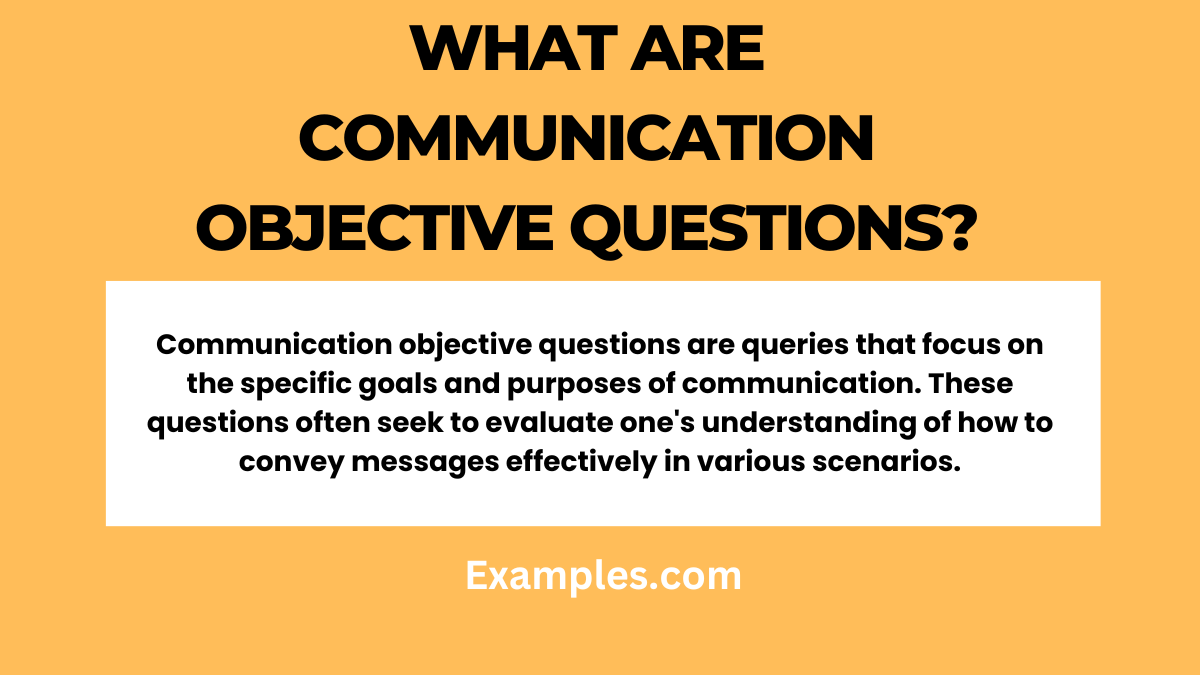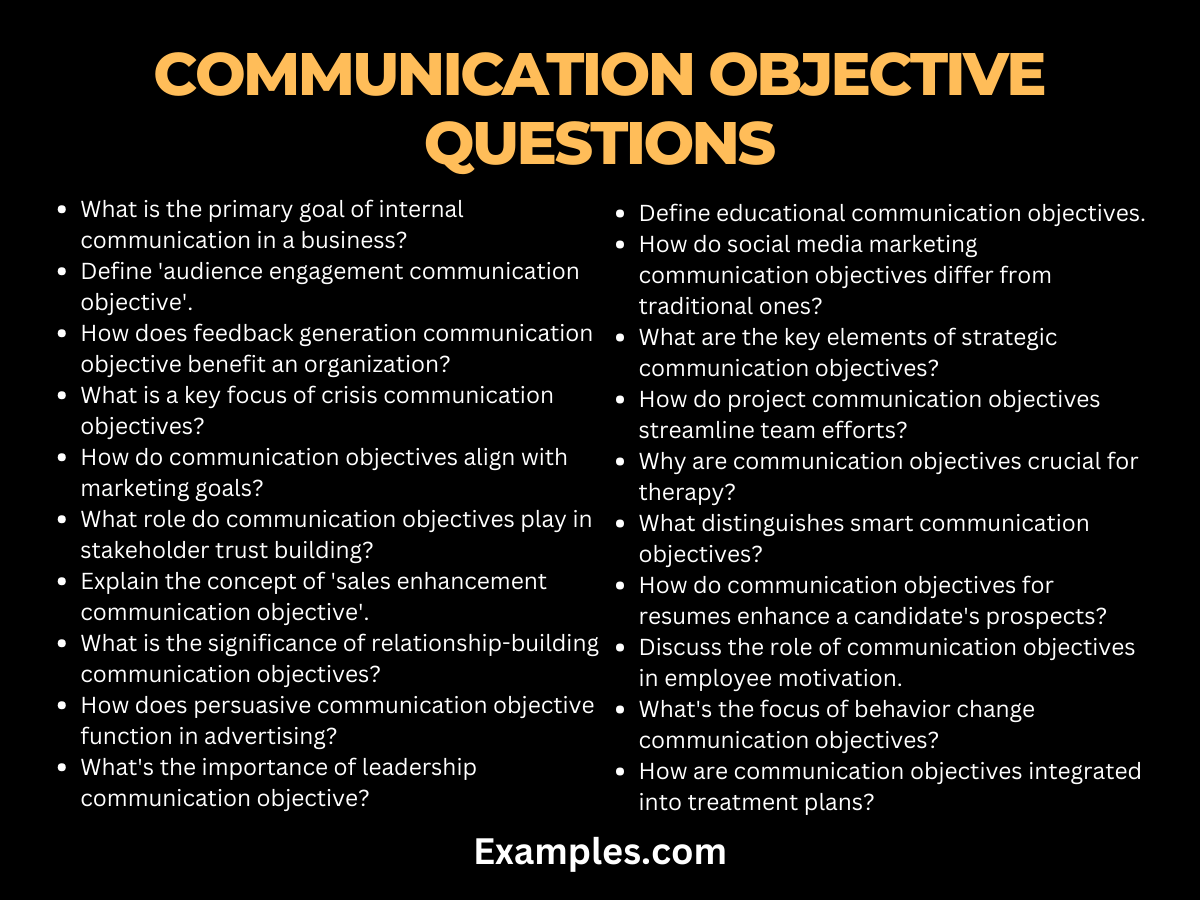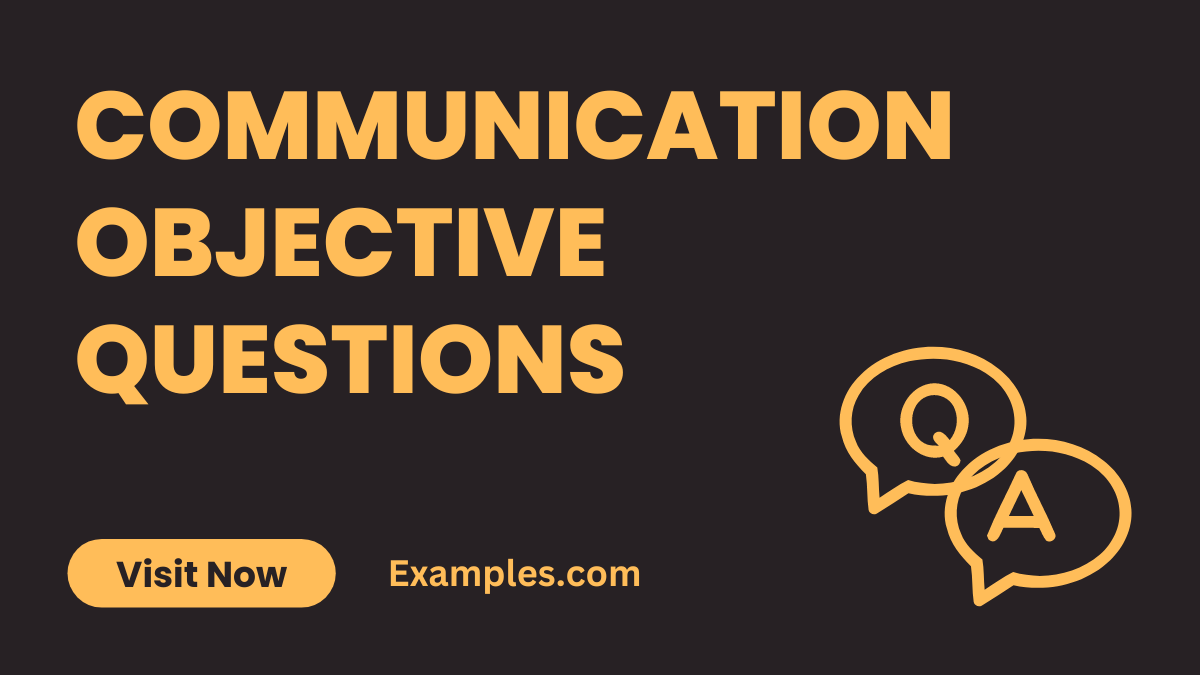49+ Communication Objective Questions Examples
Dive into the world of effective communication with our thorough guide on Communication Objective Questions. Packed with insightful Communication Objective Examples, this guide is an essential tool for anyone looking to improve their communication skills. It offers a deep understanding of different communication goals and techniques, ideal for professionals, educators, and students. Enhance your ability to communicate effectively in any scenario with our expertly curated content and examples.
What are Communication Objective Questions?

Communication objective questions are queries that focus on the specific goals and purposes of communication. These questions often seek to evaluate one’s understanding of how to convey messages effectively in various scenarios. They delve into areas like communication objectives in business or communication objectives in education, assessing how well individuals can tailor their communication strategies to meet specific goals. Such questions are integral in developing strong communication skills, applicable in multiple contexts, from professional settings to personal interactions.
50 Communication Objective Questions and Answers
Delve into the realm of effective communication with our carefully curated list of 20 Communication Objective Questions and Answers. This collection is designed to test and enhance your understanding of diverse communication strategies, from internal communication to digital marketing communication objectives. Perfect for students, professionals, and educators, these questions cover a range of scenarios, providing clarity and insight into the art of communication. Each question is paired with a precise answer, making this an ideal resource for learning and teaching.

Questions and Answers
- Q: What is the primary goal of internal communication in a business?
A: To facilitate seamless information flow and foster a collaborative work environment. - Q: Define ‘audience engagement communication objective’.
A: It aims to actively involve the audience, encouraging interaction and participation. - Q: How does feedback generation communication objective benefit an organization?
A: It helps gather insights for improvement and fosters open communication channels. - Q: What is a key focus of crisis communication objectives?
A: Managing and mitigating the impact of unexpected events on an organization’s reputation. - Q: How do communication objectives align with marketing goals?
A: They focus on conveying the brand’s message effectively to drive marketing strategies. - Q: What role do communication objectives play in stakeholder trust building?
A: They ensure transparent and consistent communication to establish and maintain trust. - Q: Explain the concept of ‘sales enhancement communication objective’.
A: It focuses on using communication to increase sales and market reach. - Q: What is the significance of relationship-building communication objectives?
A: To foster long-term relationships with stakeholders through effective dialogue. - Q: How does persuasive communication objective function in advertising?
A: It aims to influence audience attitudes and behaviors towards a product or service. - Q: What’s the importance of leadership communication objective?
A: It’s crucial for guiding teams, inspiring action, and conveying vision. - Q: Define educational communication objectives.
A: Focused on enhancing learning and knowledge dissemination. - Q: How do social media marketing communication objectives differ from traditional ones?
A: They leverage digital platforms for interactive, real-time communication and engagement. - Q: What are the key elements of strategic communication objectives?
A: Clarity, consistency, and alignment with overall organizational goals. - Q: How do project communication objectives streamline team efforts?
A: By ensuring clear and timely information exchange among team members. - Q: Why are communication objectives crucial for therapy?
A: They facilitate understanding and progress in therapeutic settings. - Q: What distinguishes smart communication objectives?
A: They are specific, measurable, achievable, relevant, and time-bound. - Q: How do communication objectives for resumes enhance a candidate’s prospects?
A: By clearly conveying skills and competencies to potential employers. - Q: Discuss the role of communication objectives in employee motivation.
A: They use clear, motivational messaging to boost morale and productivity. - Q: What’s the focus of behavior change communication objectives?
A: To encourage positive behavior modifications through targeted messaging. - Q: How are communication objectives integrated into treatment plans?
A: By setting clear, personalized goals to improve patient outcomes - Q: What distinguishes effective communication objectives in an organization?
A: They’re tailored to support organizational goals and enhance team cohesion. - Q: How do communication objectives contribute to reputation management?
A: By strategically shaping public perception and response to an organization. - Q: Define ‘market positioning communication objective’.
A: It involves using communication to establish a brand’s unique place in the market. - Q: What role does communication play in management objectives?
A: It’s vital for decision-making, team alignment, and operational efficiency. - Q: How can communication objectives improve customer service?
A: By ensuring clear, empathetic, and effective customer interactions. - Q: Describe a ‘knowledge communication objective’.
A: It focuses on sharing and disseminating specialized information effectively. - Q: What’s the aim of awareness building communication objective?
A: To increase public awareness and understanding of a specific topic or issue. - Q: How does the information dissemination communication objective work?
A: It involves spreading vital information to the right audience effectively. - Q: What is the purpose of communication objectives in advertising?
A: To creatively convey a message that resonates with and persuades the target audience. - Q: How are digital marketing communication objectives achieved?
A: Through targeted online content and strategies that engage digital audiences. - Q: What is the significance of communication objectives for nurses?
A: They ensure clear, compassionate, and accurate patient communication. - Q: Define ‘brand reinforcement communication objective’.
A: It aims to strengthen and maintain a positive brand image and loyalty. - Q: How do communication objectives support employee training programs?
A: By setting clear learning outcomes and facilitating effective knowledge transfer. - Q: What are the characteristics of a smart communication objective in social media marketing?
A: Specific, measurable, achievable, relevant, and timely goals for social media engagement. - Q: Discuss the importance of communication objectives in public relations.
A: They guide how to effectively manage and convey messages to the public and media. - Q: What are the communication objectives for treatment plans?
A: To provide clear guidance and goals for patient care and progress. - Q: How do strategic communication objectives influence organizational change?
A: They facilitate clear messaging to support and guide change processes. - Q: What’s the role of communication in enhancing stakeholder engagement?
A: Effective communication ensures stakeholders are informed, involved, and invested. - Q: How do communication objectives integrate into a project’s success?
A: By ensuring all team members are aligned and informed throughout the project lifecycle. - Q: Define the concept of ‘relationship building communication objective’.
A: It’s about fostering strong, lasting connections through meaningful communication. - Q: What are the key elements of communication objectives in crisis management?
A: Timely, accurate, and reassuring messaging to manage a crisis situation effectively. - Q: How can communication objectives aid in conflict resolution?
A: By promoting open dialogue, understanding, and problem-solving strategies. - Q: What is the focus of communication objectives in educational settings?
A: To enhance learning and engagement through effective instructional communication. - Q: How do communication objectives align with sales enhancement strategies?
A: By using persuasive and informative messaging to boost product or service sales. - Q: Discuss the role of internal communication in employee motivation objectives.
A: It involves creating a supportive and transparent work environment that motivates employees. - Q: How do communication objectives facilitate audience engagement in events?
A: By designing interactive and compelling content to keep the audience engaged. - Q: What is the significance of communication objectives in nonprofit organizations?
A: They are crucial for advocacy, fundraising, and community engagement efforts. - Q: Define ‘behavior change communication objective’.
A: It’s about using communication to encourage positive behavior changes in a target audience. - Q: How do communication objectives contribute to customer relationship management?
A: By ensuring consistent, personalized, and effective communication with customers. - Q: What are the key factors in developing communication objectives for social change?
A: Focusing on message clarity, audience relevance, and impact measurement.
Communication Skills Objective Questions
Explore the nuances of effective personal and professional interaction with our Communication Skills Objective Questions. These questions are tailored to enhance listening, speaking, and non-verbal communication abilities. They are ideal for anyone looking to improve their interpersonal skills, whether for communication objectives in education, therapy, or everyday interactions. This selection aids in understanding and refining the art of conveying messages clearly and empathetically, crucial for successful communication in various contexts.
Questions and Answers
- Q: How does active listening differ from passive listening?
A: Active listening involves engaging and responding to the speaker, whereas passive listening is merely hearing the words. - Q: What are the key components of non-verbal communication?
A: Body language, facial expressions, and tone of voice. - Q: Describe an effective way to handle miscommunication.
A: Clarify the message, listen to the other’s perspective, and seek mutual understanding. - Q: How can you improve your assertiveness in communication?
A: Practice stating your needs and opinions clearly and respectfully. - Q: What role does empathy play in communication?
A: It helps in understanding and relating to others’ feelings, fostering better interactions. - Q: Define ‘persuasive communication’.
A: It involves convincing others to understand and accept your viewpoint. - Q: How can feedback be communicated constructively?
A: By focusing on the issue, not the person, and offering specific, actionable suggestions. - Q: What is the importance of cultural awareness in communication?
A: It helps in respecting and effectively communicating with people from diverse backgrounds. - Q: How does one handle communication in a conflict situation?
A: Remain calm, listen actively, and aim for a resolution that benefits all parties. - Q: What strategies can improve group communication dynamics?
A: Encourage open dialogue, active listening, and respect for differing opinions. - Q: Why is clarity important in communication?
A: To ensure the message is understood as intended, avoiding confusion. - Q: How do you adapt your communication style to different audiences?
A: Understand the audience’s needs and tailor your message accordingly. - Q: Describe a technique for effective public speaking.
A: Practice, know your audience, and use clear, concise language. - Q: What’s the significance of tone in verbal communication?
A: It conveys emotions and attitudes which impact the message’s reception. - Q: How can storytelling enhance communication?
A: It makes the message more engaging and memorable. - Q: What are the benefits of open-ended questions in communication?
A: They encourage dialogue and deeper understanding. - Q: How can visual aids improve communication?
A: They provide clarity and enhance the impact of the message. - Q: What is the role of feedback in effective communication?
A: It helps to confirm understanding and improve future interactions. - Q: How do you manage nervousness when communicating?
A: Prepare thoroughly, practice relaxation techniques, and focus on the message, not yourself. - Q: Why is consistency important in communication?
A: It builds trust and ensures the message is reliable and credible.
Business Communication Objective Questions
Our Business Communication Objective Questions are meticulously designed to sharpen your corporate communication skills. These questions cover essential aspects such as internal communication, market positioning, and crisis management. They are perfect for professionals seeking to enhance their ability to communicate effectively in a business environment, improving team collaboration, stakeholder relations, and leadership communication.
Questions and Answers
- Q: What is the purpose of internal business communication?
A: To ensure all team members are informed and aligned with the company’s goals. - Q: How does effective communication influence customer relations?
A: It builds trust, loyalty, and satisfaction by ensuring clear and helpful interactions. - Q: Describe the role of communication in team collaboration.
A: It facilitates understanding, cooperation, and effective teamwork. - Q: What are the characteristics of a successful business presentation?
A: Clarity, engagement, relevance to the audience, and a strong call-to-action. - Q: How can communication improve employee engagement?
A: Through regular updates, recognition of achievements, and open feedback channels. - Q: Define ‘crisis communication’ in a business context.
A: Managing the dissemination of information during a crisis to mitigate its impact. - Q: What is the importance of transparency in business communication?
A: It fosters trust, reduces rumors, and builds a positive organizational culture. - Q: How do communication strategies support change management?
A: By clearly explaining the reasons for change and addressing concerns. - Q: What makes an email communication effective in business?
A: Conciseness, clarity, appropriate tone, and a clear call-to-action. - Q: How does communication play a role in conflict resolution within teams?
A: By facilitating open dialogue and understanding different perspectives. - Q: Why is it important to tailor communication to different stakeholders?
A: To ensure the message resonates and is relevant to each group’s interests. - Q: Describe the impact of digital communication tools in business.
A: They enhance real-time collaboration and global connectivity. - Q: What is the role of communication in business negotiations?
A: It’s key for understanding needs, building rapport, and reaching agreements. - Q: How can storytelling be used in business communication?
A: To make messages more relatable and memorable for the audience. - Q: What are the best practices for delivering constructive feedback in a workplace?
A: Be specific, focus on behavior, and offer suggestions for improvement. - Q: How does effective communication contribute to a company’s branding?
A: It consistently conveys the brand’s values and messages to the public. - Q: Discuss the role of communication in leadership. A: It’s crucial for inspiring teams, setting vision, and guiding change.
- Q: How do communication objectives align with a company’s strategic goals?
A: They ensure that all communication supports and promotes the overall business objectives. - Q: What is the importance of listening in business communication?
A: It aids in understanding others’ viewpoints and builds stronger relationships. - Q: How can communication barriers be overcome in a multicultural business environment?
A: Through cultural sensitivity training and adapting communication styles to diverse groups
How to Answer Communication Objective Questions
Answering Communication Objective Questions effectively is a skill that requires understanding the context, clarity of thought, and the ability to convey your message succinctly. These questions are prevalent in various settings, from academic exams to professional interviews, and mastering them can significantly impact your success.
- Understand the Objective: Each communication question is designed to test a specific aspect, be it internal communication, persuasion, or feedback generation. Grasp the underlying objective of the question to tailor your response effectively.
- Clarity and Conciseness: Your answer should be clear and to the point. Avoid unnecessary jargon or lengthy explanations. Clear responses demonstrate your ability to communicate effectively, an essential skill in both business communication and personal interactions.
- Use Relevant Examples: Incorporate communication objective examples to illustrate your point. This not only shows your practical understanding of the concept but also makes your answer more engaging and relatable.
- Structure Your Response: Organize your answer logically. Start with a brief introduction, followed by the main content, and conclude with a summary or a final thought. This structure is particularly crucial in communication objectives in business and education.
- Reflect Real-World Applications: Especially in business or professional contexts, relate your answer to real-world scenarios. Discuss how the communication objective can be applied in a business setting, a marketing strategy, or team management.
- Incorporate Keywords: Using relevant keywords like digital marketing communication objectives or crisis communication objectives can make your answer more impactful and show your familiarity with the field.
- Practice Active Listening: In an interview or interactive setting, listen carefully to the question. Active listening helps in giving a precise answer and shows your attentiveness and respect for the communicator.
- Show Awareness of Different Communication Styles: Recognize that effective communication varies depending on the audience and situation. Whether it’s a project communication objective or internal communication, adapting your style is key.
- Focus on the Importance of Feedback: Acknowledge the role of feedback in communication. Discuss how feedback helps in refining messages and ensuring they are understood as intended.
- Stay Updated on Current Trends: Be aware of the latest trends in communication, such as the rise of digital marketing communication objectives or changes in communication objectives in advertising. This shows that you are informed and adaptable to changes in communication paradigms.
By following these tips, you can enhance your ability to answer Communication Objective Questions effectively. This not only aids in academic or professional assessments but also hones your overall communication skills, an invaluable asset in any field.
Our exploration of Communication Objective Questions, complete with practical guides and tips, provides a valuable resource for anyone looking to enhance their communication skills. By understanding and applying these principles, you can effectively navigate various communication scenarios, from professional to personal, ensuring your messages are both impactful and purposeful. This comprehensive guide is your key to mastering the art of communication.



